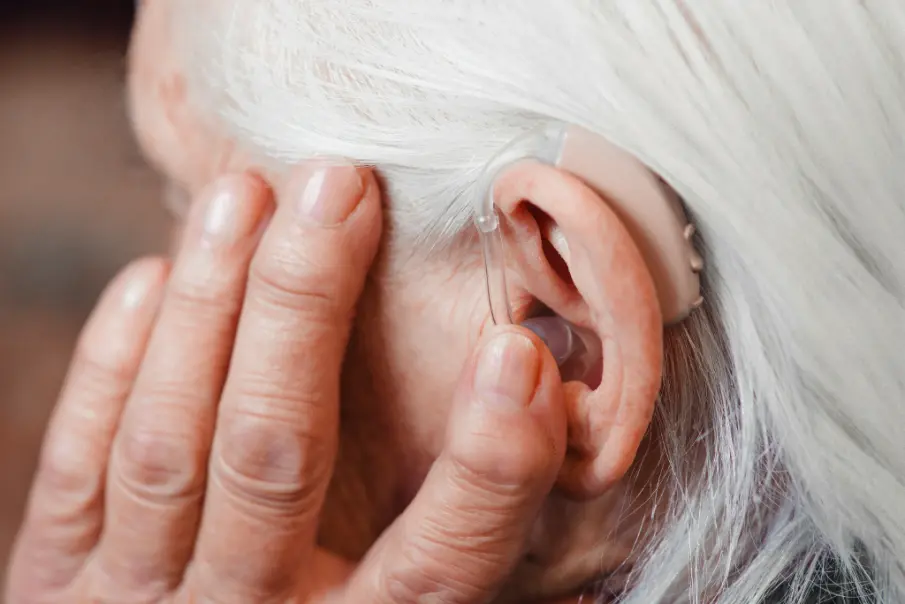Managing Hearing Loss: 6 Tips For Older Adults

As you age, your bodies undergo various changes, and one of the most common issues that older adults face is hearing loss. It's a gradual process that can significantly impact daily life, relationships, and overall well-being.
Thankfully, there are many ways to manage hearing loss effectively and maintain a high quality of life. This article will explore practical tips and strategies to help older adults cope with hearing loss and stay connected to the world around them.
1. Embrace Hearing Aids
Hearing aids are often the go-to solution for managing moderate hearing loss. These small, electronic devices amplify sounds, making it easier for you to hear in various environments. Modern hearing aids are discreet, comfortable, and packed with advanced features. They can be customized to your specific hearing needs and preferences.
When selecting a conventional hearing aid, consider factors such as your lifestyle, the severity of your hearing loss, and your budget. Your audiologist can guide you through the options and help you choose the best hearing device for your needs. They’ll also help you understand the cost of a hearing test so you can financially prepare. Remember, it may take some time to adjust to wearing hearing aids, so be patient and give yourself time to adapt.

2. Improve Communication Strategies
While hearing aids can significantly improve your ability to hear, they're not a cure-all. Developing effective communication strategies is essential for severe hearing loss management.
One way to enhance your interactions is by facing the speaker you're talking to. This allows you to see their facial expressions and lip movements, which can provide valuable context and help you understand what's being said. This is especially important if you're experiencing deafness in one ear, as facing the speaker can help you make the most of your better-hearing side.
Also, pay attention to body language, facial expressions, and gestures. You can also practice lip reading and sign language. These non-verbal cues can provide additional context and help you understand the conversation better.
3. Optimize Your Home Environment
Your home should be a sanctuary where you can hear comfortably. To achieve this, consider making some simple yet effective changes. Start by replacing auditory alerts with visual ones. For instance, swap out traditional doorbells and alarm clocks for devices with flashing lights. This adjustment ensures you won't miss important notifications.
When it comes to entertainment, don't forget the power of closed captions. Turn them on while watching TV or streaming content. You'll be surprised how much this can enhance your viewing experience, allowing you to follow along even if you miss some dialogue.
Lastly, consider the acoustics of your space. Soft furnishings like rugs and curtains play a crucial role in absorbing loud sounds and reducing echoes. By incorporating these elements, you can create a more hearing-friendly environment that minimizes noise exposure and makes communication easier and more enjoyable.
4. Make Use of Technology
Although hearing aids are the primary assistive devices for managing hearing loss, they're not the only technological solution available. A wide range of assistive listening devices can complement your hearing aids and further improve your daily life.
For phone conversations, consider investing in an amplified phone. These devices increase the volume of incoming calls, making it easier to hear and understand the person on the other end.
Your smartphone can also be your powerful ally. Numerous apps are designed specifically to assist those with hearing loss. Some can transcribe speech in real-time, while others use your phone's microphone for sound amplification. These tools can be particularly useful in noisy environments or when you need a little extra help.
5. Maintain Your Overall Health
Your hearing health is intrinsically linked to your overall health and well-being. Even if you're already experiencing mild hearing loss, it's crucial to protect your remaining hearing. This means avoiding loud noise when possible and using ear protection in a noisy environment.
But protecting your ears is just the start. Regular exercise plays a vital role in maintaining your auditory health. Physical activity improves blood flow throughout your body, including to your ears, which can help maintain the health of your auditory system.
Your diet, too, can impact your hearing health. A balanced diet rich in vitamins and minerals supports overall health, including your hearing. Lastly, don't underestimate the impact of stress on your hearing. Chronic stress can exacerbate hearing issues, so it's essential to find effective ways to manage it.
6. Seek Support
Living with hearing loss can sometimes feel isolating, but you're not alone. Seeking support can make a world of difference in how you cope with your condition.
Start by connecting with deaf people who are experiencing similar challenges. Join local or online support groups for deaf people with different types of hearing loss. These communities can provide both emotional support and practical advice, helping you go through the ups and downs of living with hearing loss.
Your loved ones can be a crucial part of your support system, but they may need some guidance. Take the time to educate your family and friends about your hearing loss and how they can communicate with you more effectively. Their understanding and support can significantly improve your daily interactions and overall quality of life.
If you find yourself struggling with the emotional aspects of hearing loss, don't hesitate to seek professional help. A therapist or counselor can provide strategies to manage anxiety, depression, or other emotional challenges that may arise.
Key Takeaway
Managing hearing loss as an older adult requires a multi-faceted approach. From using hearing aids and assistive technology to developing effective communication strategies and maintaining overall health, there are many ways to cope with hearing loss and maintain a high quality of life. So, embrace these strategies, stay proactive, and don't let hearing loss hold you back from enjoying life to the fullest.
More to Read:
Previous Posts:
Next Posts:






